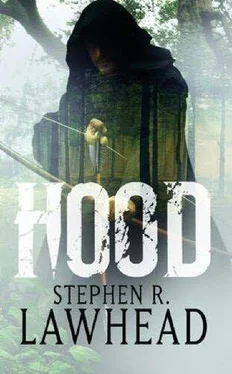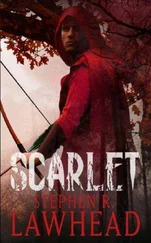Stephen Lawhead - Hood
Здесь есть возможность читать онлайн «Stephen Lawhead - Hood» весь текст электронной книги совершенно бесплатно (целиком полную версию без сокращений). В некоторых случаях можно слушать аудио, скачать через торрент в формате fb2 и присутствует краткое содержание. Жанр: Фэнтези, на английском языке. Описание произведения, (предисловие) а так же отзывы посетителей доступны на портале библиотеки ЛибКат.
- Название:Hood
- Автор:
- Жанр:
- Год:неизвестен
- ISBN:нет данных
- Рейтинг книги:4 / 5. Голосов: 1
-
Избранное:Добавить в избранное
- Отзывы:
-
Ваша оценка:
- 80
- 1
- 2
- 3
- 4
- 5
Hood: краткое содержание, описание и аннотация
Предлагаем к чтению аннотацию, описание, краткое содержание или предисловие (зависит от того, что написал сам автор книги «Hood»). Если вы не нашли необходимую информацию о книге — напишите в комментариях, мы постараемся отыскать её.
Hood — читать онлайн бесплатно полную книгу (весь текст) целиком
Ниже представлен текст книги, разбитый по страницам. Система сохранения места последней прочитанной страницы, позволяет с удобством читать онлайн бесплатно книгу «Hood», без необходимости каждый раз заново искать на чём Вы остановились. Поставьте закладку, и сможете в любой момент перейти на страницу, на которой закончили чтение.
Интервал:
Закладка:
Baron Neufmarche did not hold councils often; the last had been five years ago when he had moved his chief residence to Hereford Castle. Then he had served notice that he meant to remain in England and expected his nobles to be ready and forthcoming with their supportchiefly in rents and services, but also in advice.
Lord Cadwgan took a cloudy view of the summons to Deheubarth-the scene of the late King Rhys ap Tewdwr's recent downfall and demise-considering it an insult to the Cymry and a none-too-subtle reminder of Ffreinc supremacy and ascendancy. The rest of the family felt likewise. Perversely, only Merian welcomed the council, looking upon it as a pardon from the onerous duty that had been forced upon her. Now, instead of Merian going alone into the enemy camp, the whole family would have to go with her.
"You need not look so pleased," her mother told her. "A little less gloating would better become you."
"I do not gloat," Merian replied smugly. "But milk for the kit is milk for the cat-is that not what you always say, Mother?"
Three days of preparation followed, and the ordinarily sedate fortress shook life into itself in order to make ready the lord's departure. On the fourth day after receiving the summons, the entourage set out. All rode, save the steward, cook, and groom, who travelled in a horse-drawn wagon piled high with food supplies and equipment. The servants had dusted off and repaired the old leather tents Lord Cadwgan used for campaigns and extended hunting trips-of which there had been few in the last seven or eight yearsin anticipation of making camp along the way and at the appointed meeting place.
"How long will the council last?" asked Merian as she and her father rode along. It was early on the second day of travel, the sun was high and bright, and Merian was in good spirits-all the more since her father's mood also showed signs of improving.
"How long?" repeated Cadwgan. "Why, as long as Neufmarche fancies." He thought about it for a moment and said, "There is no way to tell. It depends on the business to be decided. Once, I remember, Old William-the Conqueror, mind, not the redbearded brat-held a council that lasted four months. Think of that, Merian. Four whole months!"
Merian considered that if the baron's council lasted four months, then summer would be over and she would not have to go to Hereford. She asked, "Why so long?"
"I was not there," her father explained. "We were not yet under the thumb of the foreigners and had our own affairs to keep us occupied. As I recall, it was said the king wanted everyone to agree on the levy of taxes for land and chattels."
"Agree with him, you mean."
"Yes," said her father, "but there was more to it than that. The Conqueror wanted as much as he could get, to be sure, but he also knew that most people refuse to pay an unjust tax. He wanted all his earls, barons, and princes to agree-and to see one another agree-so that there could be no complaint later."
"Clever."
"Aye, he was a fox, that one," her father continued, and Merian, after their stormy relations of late, was happy to hear him speak and to listen. "The real reason the council lasted so long came down to the Forest Law."
Merian had heard of this and knew all right-thinking Britons, as well as Saxons and Danes, resented it bitterly. The reason was simple: the decree transformed all forested lands in England into one vast royal hunting preserve owned by the king. Even to enter a forest without permission of the warrant holder became a punishable offence. This edict, hated as it was from the beginning, made outlaws of all those who, for generations, had made their living out of the woodlands in one way or another-which was nearly everyone.
"So that was when it began?" mused Merian.
"That it was," Cadwgan confirmed, "and the council twisted and turned like cats on a roasting spit. They refused three times to honour the king's wishes, and each time he sent them back to think about the cost of their refusal."
"What happened?"
"When it became clear that no one would be allowed to return home until the matter was settled, and that the king was unbending, the council had no choice but to assent to the Conqueror's wishes."
"What a spineless bunch of lickspits," observed Merian.
"Do not judge them too harshly," her father said. "It was either agree or risk being hung as traitors if they openly rebelled. Meanwhile, they watched their estates and holdings slowly descending into ruin through neglect. So with harvest hard upon them, they granted the king the right to his precious hunting runs and went home to explain the new law to their people." Cadwgan paused. "Thank God, the Conqueror did not include the lands beyond the Marches. When I think what the Cyniry would have done had that been forced on us…" He shook his head. "Well, it does not bear thinking about."
PART FIVE
CHAPTER
39
]Despite Count Falkes's repeated offer to accompany him, Abbot Hugo insisted on visiting his new church alone. "But the work is barely begun," the count pointed out. "Allow me to bring the architect's drawings so you can see what it will look like when it is finished."
"You are too kind," Hugo had told him. "However, I know your duties weigh heavily enough, and I would not add to them. I am perfectly capable of looking around for myself, and happy to do so. I would not presume to burden you with my whims."
He rode out from the caer on his brown palfrey and arrived at Llanelli just as the labourers were starting their work for the day. The old church, with its stone cross beside the door, still stood on one side of the new town square. It was a rude wood-and-wattle structure, little more than a cow byre in Hugo's opinion; the sooner demolished, the better.
The abbot turned from the sight and cast his critical gaze across the square at a jumbled heap of timber atop a foundation of rammed earth. What? By the rod of Moses!-was that the new church?
He strode closer for a better look. A carpenter appeared with a coiled plumb line and a chunk of chalk. "You there!" the abbot shouted. "Come here,"
The man glanced around, saw the priestly robes, and hurried over, offering a bow of deference. "You wish to speak to me, Your Grace?"
"What is this?" He flipped a hand at the partially built structure.
"It is to be a church, father," replied the carpenter.
"No," the abbot told him. "No, I do not think that likely."
"Yes," replied the workman. "I do believe it is."
"I am the abbot here," Hugo informed him, "and I say that"-he flapped a dismissive hand at the roughly framed building-"that is a tithe barn."
The carpenter cocked his head to one side and regarded the priest with a quizzical expression. "A tithe barn, Your Grace?"
"My church will be made of stone," Abbot Hugo told the carpenter, "and it will be of my design and raised on a site of my choosing. I will not have my church fronting the town square like a butcher's stall."
"But, father, see here-"
"Do you doubt me?"
"Not at all. But the count-"
"This is to be my church, not the count's. I am in authority here, comlrris?"
"Indeed, Your Grace," answered the confused carpenter. "What am I to tell the master?"
"Tell him I will have the plans ready for him in three days," declared the abbot, starting away. "Tell him to come to me for his new instructions.
With that, the abbot marched to the old chapel, paused outside, and then pushed open the door. He was greeted by two priests; from the look of it, they had slept in the sanctuary amidst their bundled belongings.
"Who is in authority here?" demanded the abbot.
"Greetings in Christ, brother abbot," said the bishop, stepping forward. "I am Asaph, Bishop of Llanelli. We would have made a better welcome, but as you can see, this is all that is left of the monastery, and the monks have all been pressed to labour for the count."
Читать дальшеИнтервал:
Закладка:
Похожие книги на «Hood»
Представляем Вашему вниманию похожие книги на «Hood» списком для выбора. Мы отобрали схожую по названию и смыслу литературу в надежде предоставить читателям больше вариантов отыскать новые, интересные, ещё непрочитанные произведения.
Обсуждение, отзывы о книге «Hood» и просто собственные мнения читателей. Оставьте ваши комментарии, напишите, что Вы думаете о произведении, его смысле или главных героях. Укажите что конкретно понравилось, а что нет, и почему Вы так считаете.







